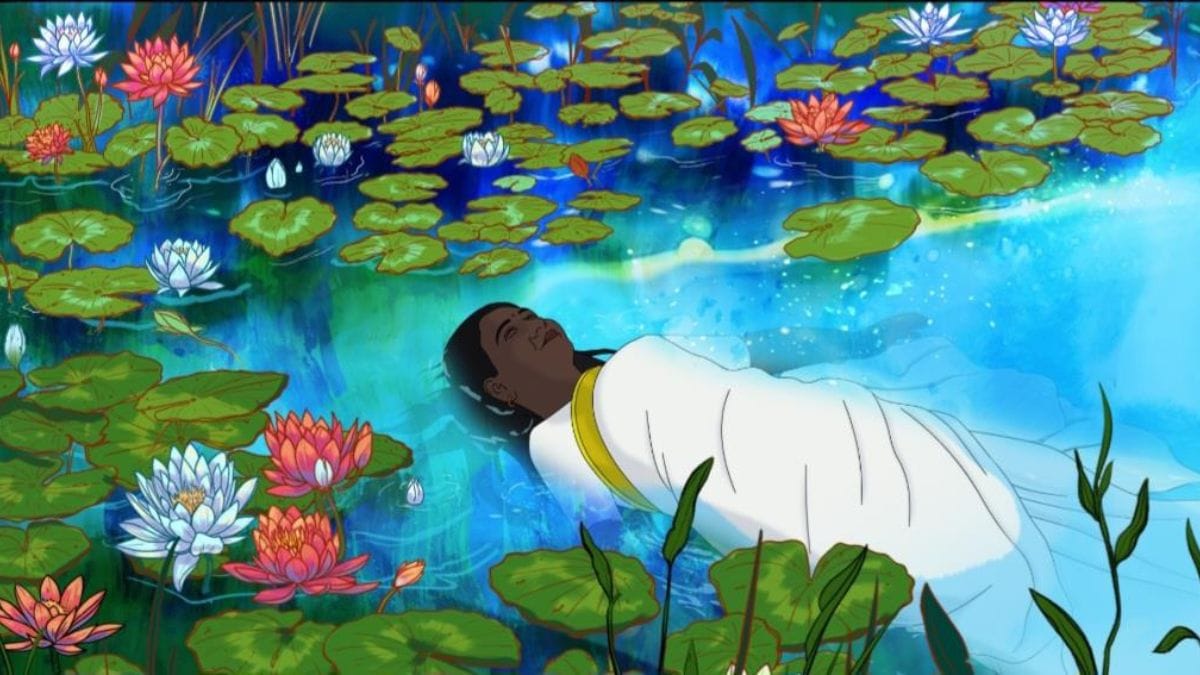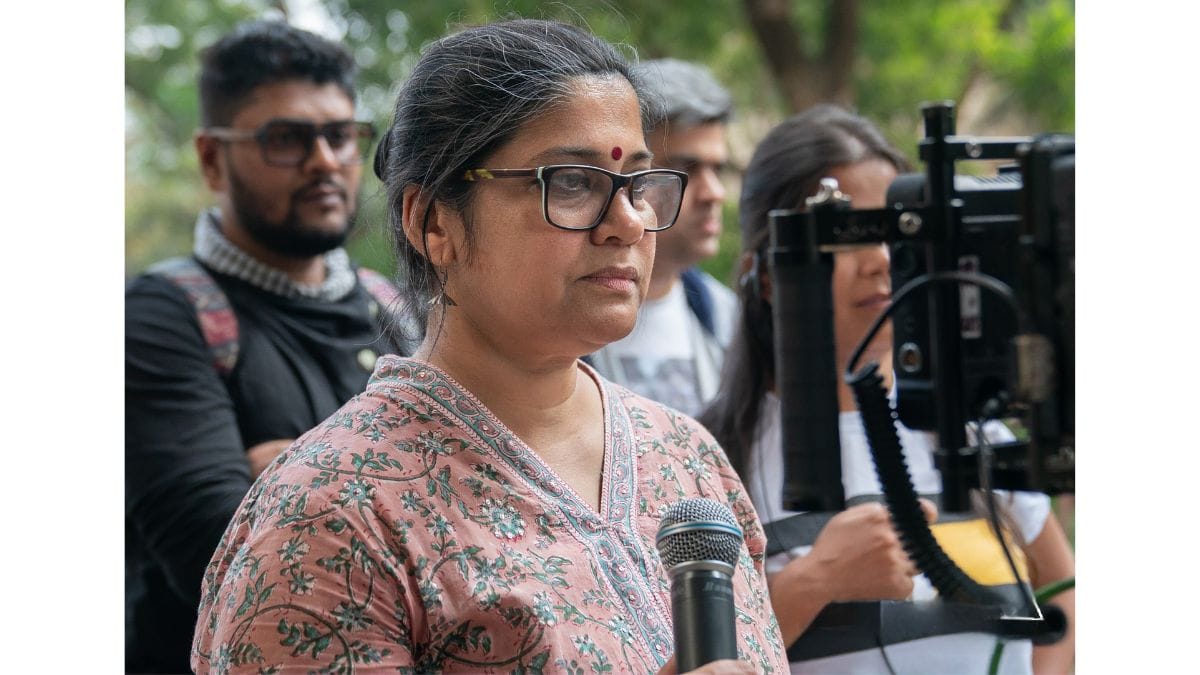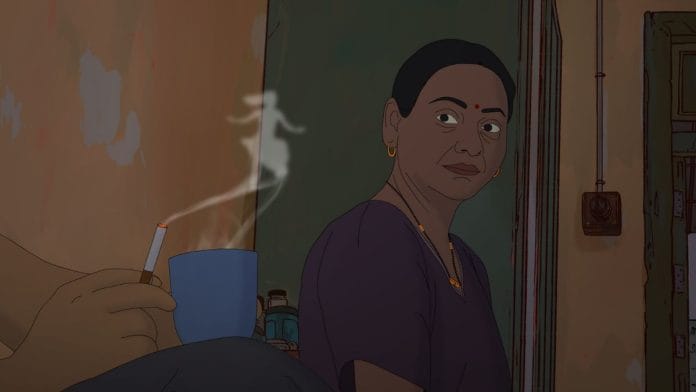New Delhi: A middle-aged married woman offers tea to her husband in the morning. But his only reaction is an irritated grunt as a train rumbles by. This scene sets the tone for actor-director Renuka Shahane’s animated Marathi short film Loop Line.
The family lives by the train tracks, and Shahane uses the monotonous regularity of the Mumbai local to highlight the mundane existence of the unnamed stay-at-home wife. Her labour is taken for granted, dismissed as duty. Loop Line is an acknowledgement of the emotional abuse that unfolds in a marriage. It’s slated to be screened at the New York Indian Film Festival on 21 June.
“Housewives provide for their families, day in and day out, without any reprieve and without receiving any gratitude. It is almost an automated life, and that’s why I wanted to use the local train as a parallel to a housewife’s routine,” said Shahane.
That is also the reason the Marathi title of the 8-minute film is Dhawpatti, which refers to a parallel track or runway.
Abuse need not be physical, and that is the movie’s message. Shahane has never shied away from uncomfortable topics. Her directorial debut, Rita (2009), looks at the physical manifestation of the emotional labour women are expected to do in relationships. Her 2021 movie Tribhanga explores intergenerational trauma.
Loop Line, too, holds a mirror to Indian society. The director’s choice to use animation was deliberate.
“Since animation does not have real people, there is a certain distance so that one can be objective, and at the same time, be involved,” said Shahane, whose favourite animated films include Kung Fu Panda series, Ramayana: the Legend of Prince Ram (1993) and Bao (2018).
When writing the script, Shahane initially planned to use animation only in the scenes where the wife escapes into her fantasy world. But as the idea progressed, animating the entire film was the natural course of action.

“We rarely use animation to explore mature themes. We either use it for children’s films or mythological themes. So, I thought why not try it, because we tend to have less bias when it comes to animated films,” said Shahane.
Also read: ‘You’ve put on a bit of weight though’—how this film on mother-daughter bond begins
Dreamland of pakoda brain
In Loop Line, the woman goes through her daily, ceaseless routine of cooking, cleaning, and cooking again. In between, there are fleeting moments where she gets lost in a fantastical world.
The smoke from her husband’s cigarette morphs into a dancing girl. She imagines floating in a pond full of lotus flowers while reading a magazine. For her, fantasy is a quiet rebellion against the monotony imposed on her life.
“In the film, the protagonist has been reduced to being an observer of her own life, without any agency. So, she expresses herself through her dreams. In her fantasies, no one can come in and judge or abuse her,” said Shahane.
This dream world she escapes to only underscores the reality of her life. In one scene, her husband brings home three colleagues for drinks, without informing her. The men indulge in sexist chatter, gossiping about a man at work, who, they suggest, may have gotten a promotion in exchange for sexual favours from his wife.
“Even our boss turned out to be lecherous,” says one of the men, and just at that moment, the wife’s pallu drops. While she hurriedly adjusts it, the husband looks at her with visible rage.
Just as her husband starts berating her in front of his coworkers by calling her a ‘buffalo’, the woman escapes into another world where she’s seen cutting up a human brain. Her fantasy world is not one of rainbows and unicorns.
She imagines the pakodas as parts of her brain that she is frying for the raucous men seated outside.
“I wanted to show how she is not required to use her brains, because all that is expected of her is her body and food. I wrote the scene with the character’s anger directed at self, that even if she stands wounded, all the men would want is the food made by her, and not care about her,” said Shahane.
Film festivals and funding

The movie features actors Mitalee Jagtap Varadkar and Anand Alkunte, who play the husband and wife, respectively. The two actors performed as the main characters in the previsualisation stage. The animation team then developed the film based on the scenes acted out by them.
Animation was a new medium for Shahahe, and she took her time learning and unlearning the process, figuring out the colour palette, and lighting in both the pre-animated and animated segments.
Loop Line has been screened at international festivals like MONSTRA Lisbon Animated Film Festival and the Thessaloniki Animation Festival. The film also has won awards for its storytelling, animation, and themes at both the Tasveer Film Festival and the Mumbai Short Film Festival.
But when Shahane started out, she could not find a producer to back her film. Soumitra Ranade, founder of Paper Boat Studios, whose company handled the animation of Loop Line, even warned Shahane that she would never be able to recover the money. Eventually, the director decided to produce it herself, and the final budget turned out to be Rs 20 lakh.
“The most surprising yet fulfilling reactions came from men, who shared how they could relate to the film, and what they had seen in their own homes, especially with their mothers,” said Shahane. The director is now writing the scripts for her next two films, one is a dark comedy, and the other is a drama on racism.
Shahane is waiting for the run of film festival screenings to end before trying to release Loop Line on any platform.
“If I don’t find any other platform, then I will release it on YouTube for free. The main purpose was never festivals, it was always about people getting to watch my films,” she said.
(Edited by Ratan Priya)






